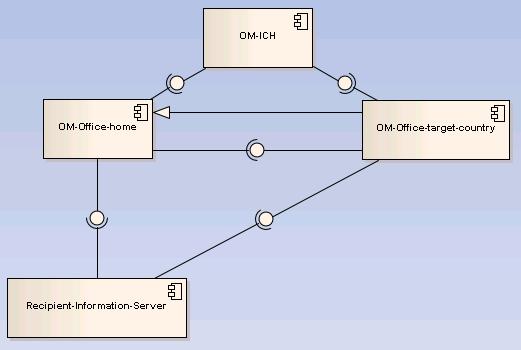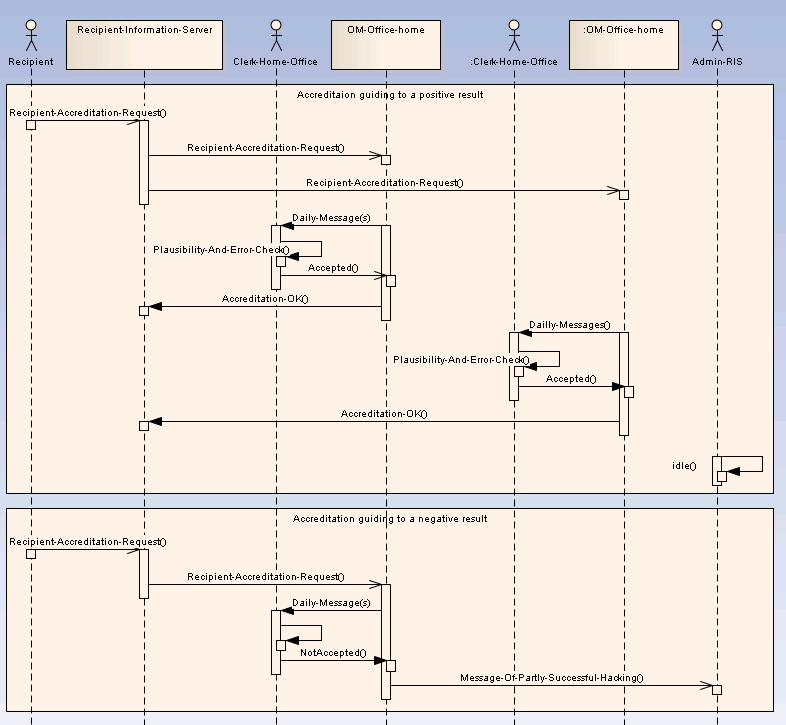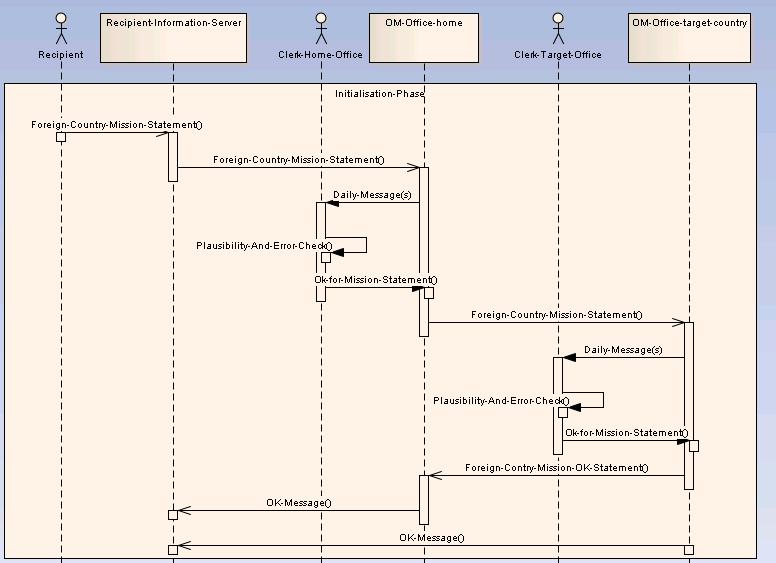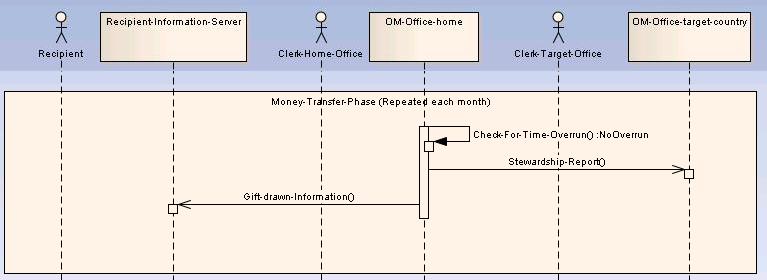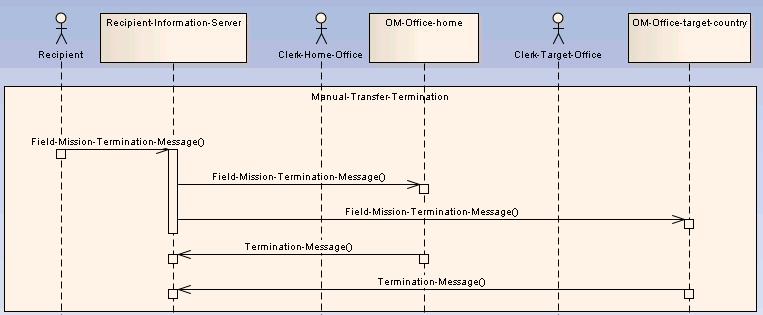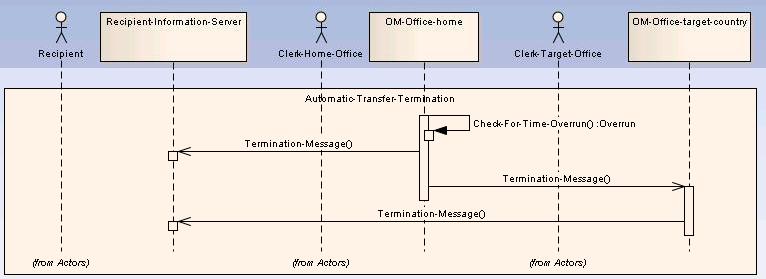Inter Office Communication: Difference between revisions
Wolfganguhr (talk | contribs) |
Joejoe2010 (talk | contribs) |
||
| (4 intermediate revisions by one other user not shown) | |||
| Line 19: | Line 19: | ||
The ICH is uniqe in the system and responsible for the information exchange and to perform some specific services. | The ICH is uniqe in the system and responsible for the information exchange and to perform some specific services. | ||
= The Recipient Information Server ( | = The Recipient Information Server (RIS) = | ||
The | The RIS is a common Webserver providing a special content-management-system (CMS). The CMS shall provide some root functionality like | ||
# double-Opt-In to create an account | |||
# a "todo"-behaviour-List in case of a lost password | |||
# different user priviledges | |||
Furthermore you have to provide some specific functions: | |||
# Joining the own account with one ore more Open-Petra-Contact-IDs (for each county there may be a different Contact-ID) = Accreditation ... | # Joining the own account with one ore more Open-Petra-Contact-IDs (for each county there may be a different Contact-ID) = Accreditation ... | ||
# Manage their own contact data like an address, phone-number and E-Mail | # Manage their own contact data like an address, phone-number and E-Mail | ||
| Line 37: | Line 41: | ||
# The recipient itself | # The recipient itself | ||
# A | # A clerk in each om-office-home | ||
# A | # A clerk in the om-office-target-country | ||
# The web Admin of the RIS | # The web Admin of the RIS | ||
| Line 63: | Line 67: | ||
Furthermore the open question how to handle the gift comments which shall be send to the recipient here comes to an answer. | Furthermore the open question how to handle the gift comments which shall be send to the recipient here comes to an answer. | ||
= | = Termination of the regular money transfer = | ||
[[File:Manual-money-transfer-termination.JPG]] | |||
There are two possibilities to terminate the automatic money transfer. The common case is done by the recipient itself who changes his mission field to an other country. The he inserts data in order to terminate the transfer at a specific date which may be “today”. | |||
[[File:Automatic-money-transfer-termination.JPG]] | [[File:Automatic-money-transfer-termination.JPG]] | ||
In the non common case the transfer will be terminated automatically by a increasing a time limit which means that the recipient will be requested to increase the limit one or two times a year to make sure that the RIS-account is still under his control. | |||
Latest revision as of 03:25, 15 December 2010
Overview
Petra is the name of the closed source product whose ideas and concepts are used to lay ground for the new open source software Openpetra, which shall be developed here. Actual in openpetra there exists an inter office communication, but in case of rewriting a software it may be a good idea to improve the communication size and format to actual standard.
The best choice for a new standard to exchange inter office data, it may be the xml-format and the best way to get an overview about the different communication types and communication contents it may be a diagram.
And UML-component diagram may not be the best choice to draw a set of offices sending communication messages from one to each other but actually my software don’t leave me an other choice. So a “component” represents an either an OM-office using an openpetra installation, the ICH using it’s own software and a recipient-information-server (RIS) which shall be developed independently from the openpetra software.
This page does not handle the Message details but only the concept of how to use the different messages in their specific content.
From the view of a recipient there exits three different types of national om offices.
- there exist(/s) (an/) office(/s) which (is/are) collecting his gift income for his mission (OM-Office-home).
- there exists one office which is actual mission field is assigned to and which is paying his invoices (OM-Office-target-country).
- there are offices he is not involved with (this offices are not refered in this documentation)
The ICH is uniqe in the system and responsible for the information exchange and to perform some specific services.
The Recipient Information Server (RIS)
The RIS is a common Webserver providing a special content-management-system (CMS). The CMS shall provide some root functionality like
- double-Opt-In to create an account
- a "todo"-behaviour-List in case of a lost password
- different user priviledges
Furthermore you have to provide some specific functions:
- Joining the own account with one ore more Open-Petra-Contact-IDs (for each county there may be a different Contact-ID) = Accreditation ...
- Manage their own contact data like an address, phone-number and E-Mail
- Submitting the actual contact data simultaneously to all recipient joined office(s)
- Receiving their gift relevant information (gift comments assigned to the recipients).
This list may be not complete ...
The Roles
The folling roles are relevant
- The recipient itself
- A clerk in each om-office-home
- A clerk in the om-office-target-country
- The web Admin of the RIS
The Accreditation Process
The very first step is the accreditation and in this case the recipient itself inserts all the data into a web form creating a data record for common use and for an use only for the communication with one om-home-office. For example his name and address is the same against each of the different offices but he will have different contact numbers and the communication stati are different.
The recipient inserts his data and start a accreditation process to each of his home office. In each of this offices this request will be checked and accepted or rejected. In case of an accepting this request, the user will be enabled to start some other automatic processes like an address or phone number update or something else. Otherwise the RIS-System-Admin will be informed about a possibly hacking attack to be able to investigate this some more detailed.
The Foreign Country Mission Statement
In common use the recipient is not know in the office of his new target country. So he himself has to send the “Foreign Country Mission Statement” to his home offices only. Of course all information can help and reduce the rest of work for the client. In the very best case he knows the account number and the number of the cost center of his new mission field. So this information shall be added to the records and shall be forwarded from the om-office-home to the om-office-target-country. Two clerks have to make some plausibility checks and both offices will have all relevant information for the automatic handling of the future money transfers.
The automatic money transfer
The automatic money transfer is done without any interaction of someone. Of course there may be some other reasons for someone to manual interfere, but here it is not necessary.
Furthermore the open question how to handle the gift comments which shall be send to the recipient here comes to an answer.
Termination of the regular money transfer
There are two possibilities to terminate the automatic money transfer. The common case is done by the recipient itself who changes his mission field to an other country. The he inserts data in order to terminate the transfer at a specific date which may be “today”.
In the non common case the transfer will be terminated automatically by a increasing a time limit which means that the recipient will be requested to increase the limit one or two times a year to make sure that the RIS-account is still under his control.
